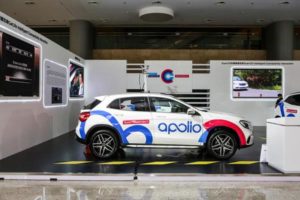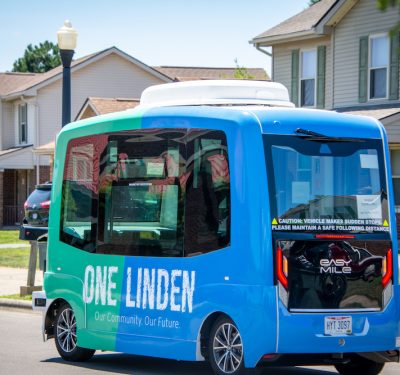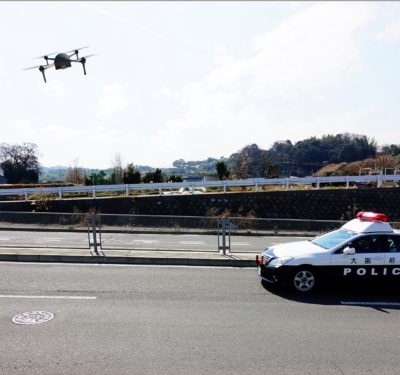
A car deployed with Apollo capabilities on display at Baidu Developer Conference in Beijing this summer. Photo credit:
Baidu Online Network Technology (Beijing) Co., Ltd.
NovAtel and its line of NovAtel SPAN GNSS+INS products designed to provide position, orientation and time as a critical component of autonomous solutions, has joined Baidu’s Apollo Autonomous Driving ecosystem – Project Apollo.
Project Apollo has been initiated to provide an open, comprehensive and reliable software platform for Baidu’s partners in the automotive and autonomous driving industries. Baidu Inc., the owner of China’s largest search engine, announced back in 2015 that the company planned to release an autonomous vehicle that year. Since that time, Project Apollo has expanded and several partnerships have helped grow technological advances.
Accurate and reliable positioning is essential to any autonomous system, and NovAtel SPAN GNSS+INS products will provide position, orientation and time as a critical component of such autonomous solutions.
“NovAtel is excited to join Project Apollo and looks forward to working with Baidu and Apollo partners to provide highly accurate positioning solutions,” said Michael Ritter, President and CEO of NovAtel.
NovAtel has a long history providing high precision, reliable GNSS solutions. “With our high-precision SPAN GNSS+INS positioning solutions, the future of autonomous driving development will reach the positioning requirements needed for a functionally safe, and exceptionally reliable solution.” Ritter continued, “Our commitment is to ensure autonomous vehicles have a highly accurate assured positioning solution.”
The Safety Critical Systems Group at NovAtel is focused on creating positioning products that will meet the exceptional performance and safety requirements of autonomous vehicles at the necessary production volumes and the required price point. Since its formation, this group of highly skilled engineers has made many positive inroads into the automotive industry, and joining the Baidu Apollo ecosystem is another step towards ensuring the future safety of autonomous vehicles. Apollo provides an open, reliable and secure software platform for its partners to develop their own autonomous driving systems through on-vehicle and hardware platforms, according to the Chinese company.
Partners can use the Apollo open software platform together with the reference hardware platform to accelerate development of their customized autonomous vehicle solutions. More information about the Baidu Apollo ecosystem can be found here http://apollo.auto/ .
In September, Baidu announced the release of Apollo 1.5, the latest iteration of the company’s Apollo open-source autonomous driving platform. The company also announced a 10 billion RMB ($1.5 billion) Apollo Fund to invest in 100 autonomous driving projects in the next three years.
Building on Apollo 1.0, Apollo 1.5 opens up five additional core capabilities which include obstacle perception, planning, cloud simulation, High-Definition (HD) maps and End-to-End deep learning, providing more comprehensive solutions to developers and ecosystem partners to accelerate the deployment of autonomous driving.
The obstacle perception capability enables vehicles to accurately identify obstacles during both day and night. With the planning capability, vehicles can plan the correct driving path and make optimal driving decisions. The cloud simulation system on Apollo is the only platform that provides open, built-in HD maps tailored for autonomous driving. Based on large scale cloud computing capacity, Apollo has a vast amount of real traffic data in China, and has a virtual running capacity of one million kilometers per day.






